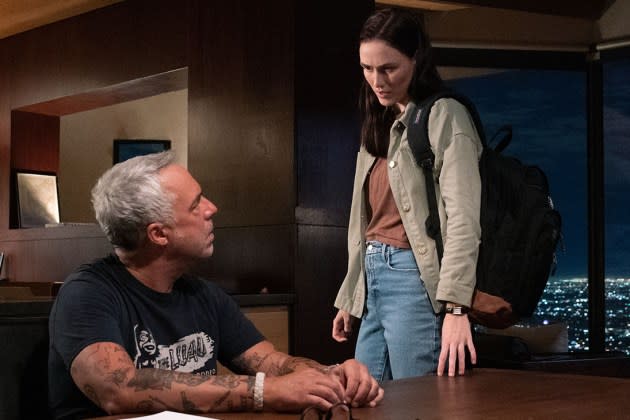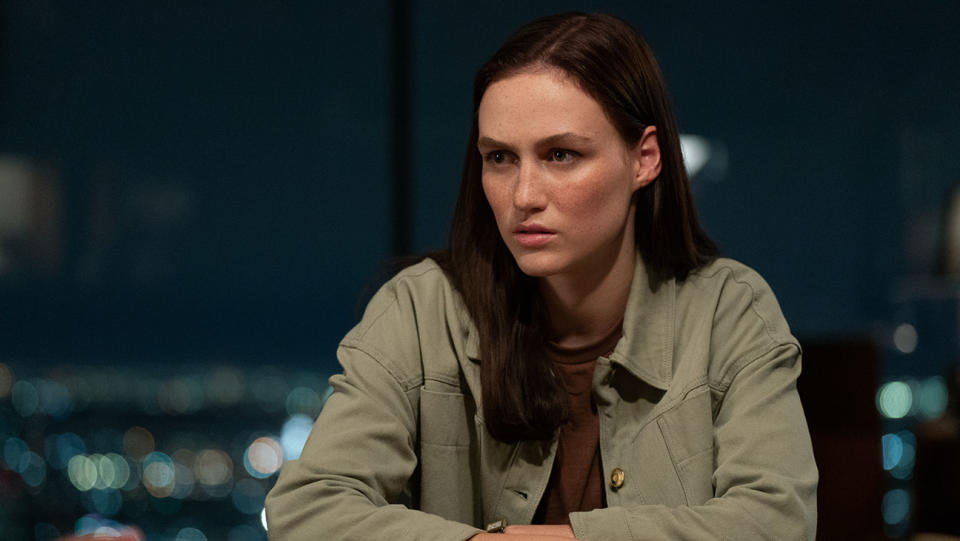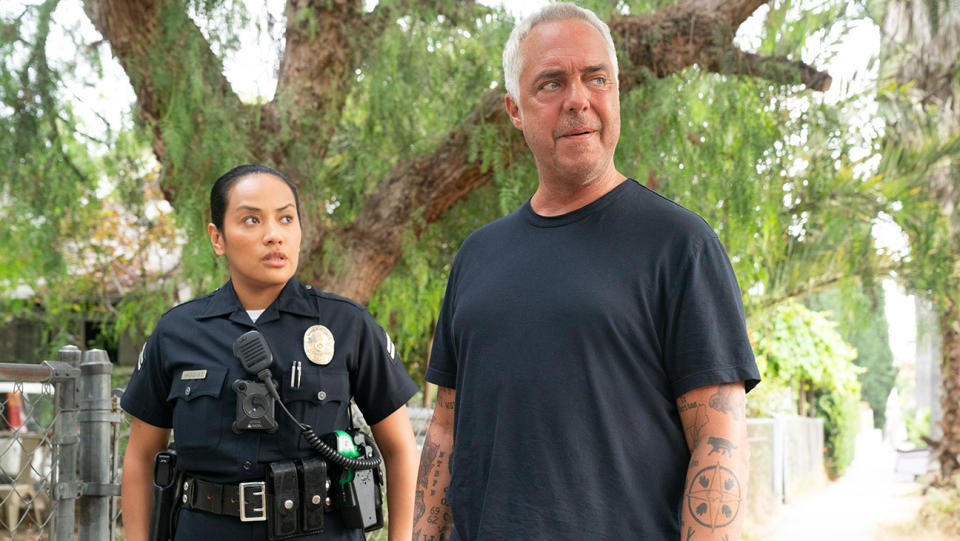‘Bosch: Legacy’ Director Unpacks the Gut-Punch Scenes of Season 2 Premiere
- Oops!Something went wrong.Please try again later.

[This story contains spoilers from the two-episode premiere of Bosch: Legacy.]
Sharat Raju is no stranger to the world of crime, justice and punishment as a director for popular police and lawyer series such as Law & Order, NCIS: New Orleans and Criminal Minds. He’s even directed episodes about law and justice in the world of zombies via The Walking Dead franchise.
More from The Hollywood Reporter
Leighton Meester, Robbie Amell Christmas Rom-Com 'EXmas' Lands at Amazon Freevee
Creators Once Dreaded the Pressure of Ratings, Now They're Fighting for the Data
Yet, for Raju, the long-running Bosch franchise holds a unique place in his career that’s a bit different from his previous gigs. The director recently spoke with The Hollywood Reporter on a Zoom video chat from Los Angeles to talk about how he became a part of the Bosch team and his guidance on the two-episode premiere of Bosch: Legacy season two (now out on Amazon Freevee and already renewed for season three).
How did you become a part of the Bosch family, did it start with Bosch: Legacy or before?
I started on Legacy, and, I have to confess that I didn’t actually watch the original show initially. And then, I don’t know how I get jobs at all (laughs), but my agent may have said, “You know this show is interested to meet with you, you should watch it.” So, I watched the first season and first few episodes, and I just got hooked. And then I ended up watching the whole thing because it was so good!
I really loved the writing. I loved The Wire, and it has a lot of the bones of The Wire for Los Angeles. Then they offered me to come on board to direct an episode in the first season [of Bosch Legacy] and I sort of ended up in the family. And then I got to do the first two of the second season which are like a little mini-movie. So that’s sort of how I met the team.
The first two episodes of season two are very intense — even in the first five minutes, with the abduction scene of Maddie Bosch (Madison Lintz) by the masked rapist. What went into choreographing that scene and making it safe for both actors involved?
What is really kind of amazing about that scene, just from a practical standpoint, is that almost all of those stunts are done by Madison. The way we prepared it, the stunt coordinators and the stunt performers came up with a concept and we talked about it. And we knew the way it was set up [from the last episode of season one], that she kind of went away into the corner of the room and then came back to take off jewelry; so, we knew we had a starting point from how they set us up in the cliffhanger. From there we had a little freedom of what happened, so we wanted her to be surprised from behind but fight back, because she is a cop and she’s trained to fight and she’s surviving.
But we also wanted to have a moment where you think, maybe she’s going to get away because she’s at the door. So, all of these beats were alked through with the stunt coordinator. Then they went off and came up with a plan. We adjusted it. And then they showed it to Madison and the stunt performer — because he’s wearing a mask, it’s not David Denman [who plays the abductor, Kurt Dockweiler.] David just has to take the mask off, right?
But it was a pretty confined space. It’s a set, but it’s still a very small set. So there weren’t a lot of places to go. Which also meant there wasn’t a lot of space where we could hide a stunt person for Madison. So, it just had to be her. And she was so good that it didn’t matter. We just used her for basically everything.

So, Madison is doing all the acting in the confined spaces when her abductor places her in the coffin and buries her in the Mojave Desert? Is she claustrophobic?
(Laughs) If she was, she didn’t tell us! She’s also apparently not afraid of bugs — that was a real scorpion [crawling around in the coffin with the confined Maddie Bosch character.] We had, I think, like five or six scorpions. If one couldn’t do it [crawl around for the scene], we swapped it out for another one.
I would imagine that was done on a soundstage?
Correct. So that was tricky, too. Because we had a box and they had to make a couple different versions of this box. We had to have the illusion that we’re inside it, right? We had to feel like it’s not on a stage, so we had a box that had the profile side removed, and then we had the box that had the top side of removed. And then we also had portions of it, because it is a little bit of a cheat. Because truly the only light source in there is the breathing tube, but we had to see her. So, we came up with the idea of the camera itself having a light on it. So, the red light really was a really a great idea. I don’t remember who came up with it, but there was some kind of combination where you had this feeling like she’s in hell when the red light goes on. So that’s that was part of our thinking behind it.
[Madison] was in those boxes for like 10 hours! She’s so good! She’s obviously been on the show since the beginning. She grew up on the show when she was an adolescent, and now she’s an adult. So, obviously she is very comfortable and she’s just a great, great actor. She has really flourished, I think, since Legacy started as being sort of the counterpart to the Titus Welliver role.
You have directed episodes of Law & Order, Criminal Minds, and various other police/detective television shows. What’s the difference between directing on those shows and Bosch: Legacy?
That’s a good question. In a lot of those, the cases sort of tie up in one episode, right? Especially for those like Law & Order and Criminal Minds to some extent. Criminal Minds sometimes has changed a little bit in the new version, but those shows, and NCIS too, all sort of have the cases start, the guest star comes in and the cases resolve. Bosch, even from the original one to Legacy, feels closer to what criminal justice looks like: It’s slower, you have one case usually unfolding for a season and you’re sort of met with administrative malaise. You have a lot of fighting the inertia of city government and city policing. And that’s why Bosch’s character is so good, because he actually wants justice for these people.
So, the pace feels like it’s closer to what it is when it actually happens, and Bosch feels like, I hope, there’s someone doing what he does in the real world. And you don’t have an obligation to tie things up, so then you can be a little more cinematic and filmmaker with the storytelling. There is a lot of freedom for directors to use all the tools as a filmmaker to tell the best story you can.

Let’s talk about directing Titus. You had some very deep scenes in these first two episodes, especially one where Bosch must go to the morgue and potentially identify a corpse as who might be his abducted daughter.
I’m glad you brought that up. When I first got the scripts, I think it was his reaction to what he has to go through and potentially see that his daughter might be dead, but then she’s not. And it was scripted in a type of reaction that was a little angrier, and I knew that wasn’t maybe exactly right, or I had a different interpretation. And so, me and Tom Bernardo, the writer, started talking and then he said we should involve Titus early. This was the beginning of the season, so the actors hadn’t started working yet. And I just knew that Titus had been playing the character so long that he has such good instincts about it, and he’s so good at tapping into his own emotions as a person, and then also portraying, that he’s going to have an opinion about this. And he’s going to have something that feels right. And so, his approach was, “Let’s just see what happens.”
We just did one take, especially when he is coming out [of the morgue] and breaks down. He just wanted to have space to feel. I just had to put the camera in the right place and let him behave. And we did that one take, and it was so good. But of course, I’m so greedy and wanted another one. He was very honest and said, I don’t think I can do one more. So, I feel when you have a scene with an actor who goes to such a deep place, and a place so wrenching, you just can’t go to the well that many times because it’s not going to be still that wrenching the further down you go from the original.
Even going back to the scene where he actually pulls off the sheet from her [the body in the morgue], in my mind it was like, he slowly does it. But then he said, “No, I think I would take a breath and then just rip the Band-Aid off.” So that’s why he does it quickly, and then him putting it back gently over the victim was all Titus. It wasn’t written that way, it wasn’t me either. I had never thought of it and then he did it, and it was like, “Oh yeah, this is what Bosch would do. He would be relieved, but he would have compassion for this other victim, who is this Jane Doe.”
Interview edited for length and clarity.
Bosch: Legacy releases new episodes Fridays on Amazon Freevee.
Best of The Hollywood Reporter

